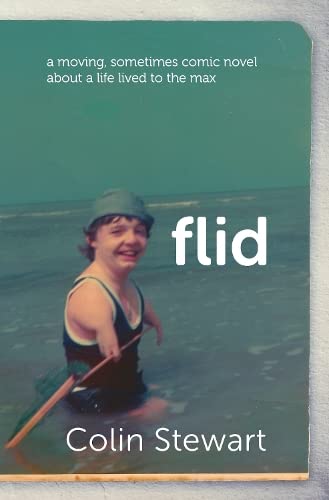
Find Colin Stewart on
table number 53
at the summer
Oxford Indie Book Fair
on 13-July 2025
See home page for details, map and more.
Writing about Disability
Though Flid is a novel about a man born with severely reduced arms and legs, it was never my intention to write a book about disability, nor to follow the narrative arcs generally applied to ‘disability fiction’ (where pity and sympathy lead inevitably to a triumph against the odds).
Flid was not written to move the reader to sympathy, nor to break down barriers, nor to score political points, but was instead a story that interested me on many levels – a story that I believed had literary potential.
I came to Flid from the perspective of making great art and only really appreciated the wider questions (and difficulties) of ‘disability’ – and the extent to which the general reader would be expecting a redemptive and heartwarming narrative – when the novel was already at an advanced stage.
My ignorance of disability would, happily, allow for an unimpeded approach to the subject matter, which I was able to tackle on its own terms – that of character, theme, language and structure – rather than being drawn into the ‘disability’ tropes usually employed.
All writing is political to some extent, of course – if only because of the choices we have to make – and I soon came to understand that my whole approach was an implicit challenge to the way that disability is usually portrayed.
Eschewing sentiment and euphemism for a more honest and direct telling, Flid was aggressive and irreverent, while avoiding a simplistic dialectic.
Flid would also provide for a critical examination of everyday language, with the employment of various unconsidered terms in unexpected contexts bringing out the assumptions that are built into them.
I would thus use phrases like ‘emotionally crippled’ or ‘handicapped’ to draw attention to the genealogy of such terms, with the active and liberated life of the main character a striking contrast: for, while the semantics might suggest that a man without legs cannot walk, Kevin is clearly able to ‘go for walk’ – with friends or lovers – just like anyone else can. I leaned into such inbuilt linguistic ambiguities.
The knowingly contentious title – Flid – employs a disablist word (and former term of abuse) to reclaim and subvert its usage through a character whose range of life represents a natural counterargument to any such negative application.
The stark and abrasive manner (and sound) of the word Flid was also in keeping with the anarchic nature of our hero, with Kevin a confident and ebullient man who doesn’t suffer fools – as radical in his politics as he is in his life.
Telling Kevin’s story without sentiment or condescension was to implicitly push back against the generally applied tropes of disability fiction, allowing for a subtly drawn character rather than a reduction to a physical condition.
Paul Hunt – an early disability activist – argued that ‘we are tired of being statistics, cases, wonderfully courageous examples to the world, pitiable objects to stimulate funding.’
Kevin (and Flid) – with all its detail and specificity – was most definitely NOT this!
Turning his thoughts to the question of intersectionality, Steven Spohn suggested that the ‘Bechdel Test’ should be adapted and applied to the depiction of disability, arguing that disabled characterisations should be judged on the agency and purpose they provide (beyond disability).
To the possible frustration of the reader – in not providing what they might think they want – I’m happy to be able to say that Kevin (and Flid) would have passed any such ‘Bechdel Test.’
The academic Colin Barnes defined the ‘tropes’ of disability as:
- Pity: showing disability as something to sympathise with.
- Cruelty: showing the disabled as powerless and beaten down.
- Evil: you only have to look at the typical Bond villain to see how often physical/mental disability is taken to be the root cause of evil intentions.
- Super Cripple: a Rain Man, or a Forrest Gump, whose exaggerated superpowers are to be seen as some sort of recompense (for disability).
- A prop: acting as a stage set, or cypher, to advance the plot.
- Figure of fun: the disabled character operating as a comic foil.
- Own worst enemy: where a person’s agency is reduced to their disability (and judged on such parameters).
- A burden: here the disabled character is primarily defined by their needs (and the assistance they may require).
- Asexual: the disabled should not, of course – under any circumstances – be having sex (and there should certainly be no open description of such)!
- Ordinary Life: this is to minimalise and reduce the difficulties that someone like Kevin might actually face (normalising their situation).
When I first encountered this list, I was delighted to be able to say that my instinct in telling Kevin’s story on its own terms had led to the natural avoidance of such a reductive set of tropes.
Writing fiction is a process of stepping into other shoes, of bringing characters to life, of offering some truth. I believe that no story should be off limits, even if the ability of the writer to tell that story will vary.
While research – and due diligence – will likely be required, writing ‘truthful’ fiction is about developing a feel for the characters you are trying to depict, a feel that will hopefully take us beyond the limitations of caricature and stereotype.
For too long, disability narratives in popular culture have approached their subject in the same reductive ways, exploiting the source material with simplistic and condescending narratives: this is the opposite of what any novel should be.

